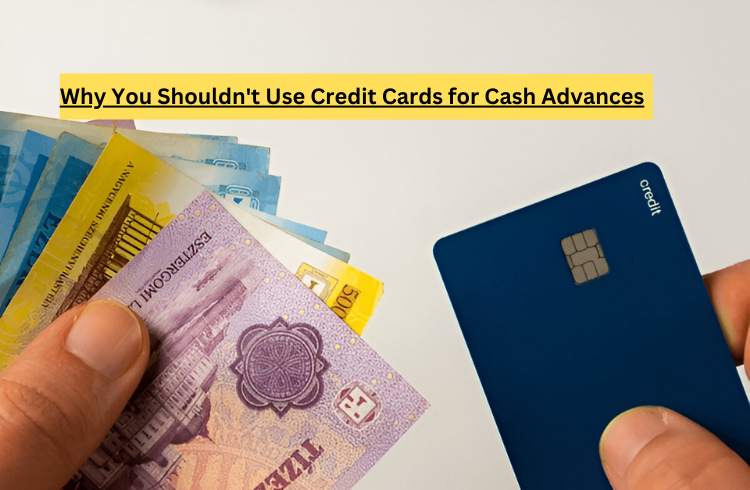Why You Should Not Use Credit Card Cash Advances
While credit cards are handy tools for handling regular bills, utilizing them for cash advances can fast cause financial problems. Although using credit card cash advances seems like a simple approach to receive money when you’re short-funded, there are major expenses involved that could compromise your financial situation. This post will look at why you shouldn’t use credit cards for cash advances and offer practical advice to help you stay clear of the dangers of this dubious financial habit.
A credit card cash advance is what?
Understanding what a cash advance is will help you to better appreciate why you shouldn’t use credit cards for cash advances. You are making a cash advance when you use your credit card to request cash from a bank or financial institution or withdraw cash from an ATM. Though this may seem like using your card to make a transaction, it is much different and far more expensive.
Generally speaking, cash advances have greater fees and interest rates than standard purchases. Usually lacking a grace period, this means that interest begins to build from the minute the money is taken out. Knowing why you shouldn’t use credit cards for cash advances depends on an awareness of these implications.
Why Should You Not Use Credit Cards for Cash Advances: The Actual Expenses
The great expense linked with credit cards is one of the main reasons why you shouldn’t use them for cash advances. Using your credit card for cash advances carries the following most important financial negatives:
One of the primary reasons why you shouldn’t use credit cards for cash advances is the high interest rates. Cash advances offer far higher interest rates than standard purchases, in which case you might have a grace period or even a lesser interest rate to pay off your balance. Depending on your credit card terms, these fees could run from 20% to 30% or more.
Interest begins to build the moment you draw a cash advance. There is no grace period, hence from the first day you will start paying interest on that amount. This can rapidly mount up, so it is far more costly than just using your card for purchases or looking for another type of financing.
Additional Charges
The extra fees involved with credit cards for cash advances also explain why you should not use them. Usually charged a fee of 3% to 5% of the total amount taken out, a cash advance is Usually put on right away, this charge increases the cost of using your credit card for cash access.
If you withdraw $500 in cash, for instance, you can be charged an instantaneous fee of $25 (5%) on top of the interest that starts to build immediately away. Cash advances are a quite expensive financial decision considering these costs and the high interest rate.
Most credit card purchases involve a grace period between the date of purchase and the due date for your payments. If you pay your balance in full within this period, you will avoid interest. Cash advances, nevertheless, lack this advantage.
Effects on Ratio of Credit Utilization
The bad effect credit cards can have on your credit score is another reason you shouldn’t use them for cash advances. Determining your credit score mostly depends on how much credit you are utilizing in relation to your whole available credit.
Especially if you currently have a load on your card, a cash advance might dramatically raise your credit use ratio. High credit use might reduce your credit score, so making it more difficult for you to qualify for loans, mortgages, or even future more credit cards.
- ATM Fees: Should you use a credit card to withdraw a cash advance from an ATM, you could additionally be charged an ATM fee on top of the advance charge and interest rate. If you often take out cash advances, these fees—though tiny on their own basis—can soon mount up.
For instance, you start with a $3 loss before adding the 5% cash advance fee and the interest if the ATM costs you $3 for each withdrawal and you take out $100. These additional costs emphasize why you shouldn’t use credit cards for cash advances unless really necessary*.
Variations from Credit Card Cash Advances
Having discussed why you shouldn’t use credit cards for cash advances, let’s now look at some other, less expensive approaches to handle financial crises or obtain funds without turning to this expensive one.
If you require cash right now, think about applying for a personal loan rather than a cash advance. Usually featuring cheaper interest rates and more flexible payback terms, personal loans Unlike cash advances, they usually lack immediate costs and allow you to stretch out your payments over a longer term, so facilitating management of the cost.
Although it could feel awkward, borrowing from friends or relatives can be a far more reasonably priced choice than applying a cash advance. By being honest about your circumstances and outlining precise terms for repayment, you can assist to avoid the hefty interest rates and fees associated with credit card cash advances.
If you have a line of credit, this can be a significantly less expensive way to obtain cash than running a credit card cash advance. Usually with lower interest rates, lines of credit are a more reasonable approach to meet unforeseen costs since you only pay interest on the amount you really borrow.
- Overdraft Protection: Sometimes a better choice than a cash advance if your financial crisis stems from your bank account is employing overdraft protection. Though they are not perfect, overdraft fees are usually less than the interest and fees connected with credit card cash advances.
Establishing a budget and building an emergency savings will help you to prevent first need for a credit card cash advance. If you save a little bit of money every month, you will have a cushion that will help you pay for unanticipated costs without using pricey credit choices.
Why You Should Not Use Credit Cards for Cash Advancement Long-Term Effects
Knowing why you shouldn’t use credit cards for cash advances transcends just avoidance of immediate interest and fees. Using cash advances carries long-term effects that could compromise your financial situation for years to come.
One of the main long-term effects of using cash advances is possibly damage to your credit score. High credit use can, as was already indicated, damage your credit score; but, the high cost of repaying the advance runs the danger of missing payments. Late or missed payments stay on your credit report for seven years, which makes recovery from the financial impact challenging.
- Higher Debt Levels: Cash advances could cause debt to mount up beyond your control. The high costs and interest rates make it challenging to pay off the balance; if you begin routinely depending on cash advances, your total debt may spiral out of control. This makes it more difficult to save for the future or meet significant financial objectives as house purchase or comfortable retirement.
- Pressure on Monetary Well-being: Using cash advances might start a financial stress cycle. Managing daily spending gets more difficult when you are continually trying to pay off high-interest advances. This strain might cause you to get into a financial rut and compromise your capacity to save, invest, or make significant purchases.
In conclusion
All told, there are several reasons why you shouldn’t use credit cards for cash advances. Cash advances are among the most costly methods available from high interest rates and fees to long-term credit score ruin. To guard yourself against financial crises, instead look at other choices include developing an emergency fund, lines of credit, or personal loans.
Making wise financial decisions depends on knowing, first, why you shouldn’t use credit cards for cash advances. Steer clear of this expensive trap and look for more reasonably priced substitutes to keep control over your money and stay debt free.

